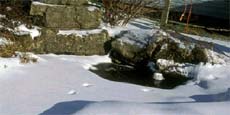Choose a method that will best suit you and your budget. First determine if your pond is likely to freeze solid. The pond’s location, size of fish and the number of fish all have an effect on the success of overwintering goldfish. Reduce feeding as the temperature cools in the fall. Fish metabolism slows down considerably and they may not be able to digest food. Tetra Pond Spring & Fall Diet fish food is recommended for fall feeding (and also in the early spring). Do not feed when water temperature is below 10°C or 50°F. The following methods are suggestions for smaller ponds that allow for drainage and capture of fish. When drainage is not practical, as in large or natural ponds, wintering is best left to Mother Nature. Drainage may not be necessary, if there is little debris and/or leaves in the pond. However, a 1/3 partial water change is recommended in the fall and the following spring. During water changes, replace water slowly using nozzle spray and add a water treatment such as Aqua Safe. (See Tetra Pond Aqua Safe in Pond Water Treatments).
METHODS:
A. Minimize the leaves that fall into your pond. The use of netting will help to eliminate this problem. Drain the pond in late fall after the leaves from nearby trees have fallen. Move the fish to covered containers filled with pond water. Clean leaves and other debris from the pond, then refill. Let fresh water sit at least 24 hours to allow chemicals and dissolved gases to dissipate. If chloramines are present a neutralizer may be required. Place the fish back in the pond. Make sure fish are not stressed during this procedure by keeping their water cool and oxygenated.
OR

OR
C. Remove the fish from the pond and bring indoors to an aquarium or tank for the winter. Keep the tank relatively cool and feed moderately. Oxygenation, filtration and partial water changes are recommended. Return the fish to the pond the following spring, being careful not to shock the fish with a sudden temperature change.
NOTE:
-More fish die from toxic gases produced by rotting vegetation trapped in the water than die from freezing.
-Healthy Goldfish and Koi have a greater chance of surviving the winter.
-Try to minimize stress when overwintering.
-When transferring fish, ensure water temperatures are similar by floating containers before release.
Water gardeners in Canada frequently use the previous overwintering methods for fish. These suggestions can be used alone or in combination with one another to best suit your situation. There is no guarantee that your fish will survive the winter. By trying these commonly used methods your chances for success will be increased. We would be glad to hear from you if you have found other ways to overwinter your fish successfully.





